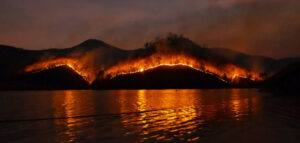Do you recall your childhood summers? They were a time of exploration, laughter, and carefree days. However, as we face the present-day realities, our summers are now frequently interrupted by an ominous adversary – wildfires.
A Growing Issue – The Rise of Wildfires
In recent years, wildfires have become an annual dread, a too-frequent visitor that overstays its welcome. The increase in wildfires is startling. Our landscapes once our playgrounds are being transformed into battlegrounds more often. The reasons are multifold – climate change, human activity, and natural causes. Each one alone can be a potent force, but together, they are fuelling an increasing frequency and intensity of wildfires. It’s not the fires alone that should worry us but a far-reaching enemy that they bring with them – wildfire smoke.
The Unseen Foe – Wildfire Smoke
This unwelcome visitor is a peculiar cocktail of carbon dioxide, water vapour, carbon monoxide, particulate matter, hydrocarbons, other organic chemicals, nitrogen oxides, and trace minerals. The most worrying ingredient is particulate matter (specifically PM2.5). These tiny particles, almost invisible to the naked eye, can penetrate deep into your lungs. They can cause minor irritations like itchy eyes and a runny nose to serious conditions like heart and lung diseases.
The Tip-Off – Detecting Wildfire Smoke
Wildfire smoke can be sneaky, subtly creeping into our spaces before we realize it. Its presence often shows up as a change in air quality and visibility. The once-clear horizon may take on a hazy, smoky appearance. The air might take on an acrid smell, similar to a campfire. Our bodies also send us signals, such as burning eyes, cough, shortness of breath, or even an unusual feeling of tiredness. Pay attention to these signs and take appropriate action promptly.
The Shield – How to Protect Your Tribe
So, how do we shield our tribe from this hidden foe? Here’s your strategic plan:
Stay Ahead of the Game: Keep track of local air quality reports, news updates about wildfires, and public health advisories.
Claim Your Territory: When advised, retreat indoors, close all doors and windows, and circulate the air with fans or air conditioning units.
Clear the Air: Equip your home with a high-efficiency particulate air (HEPA) purifier to reduce indoor particulate matter.
Suit Up: If outdoors is a must, gear up with a mask. N95 respirators offer good protection against tiny particles.
Create a Safe Haven: Dedicate a clean room in your home as your retreat when it’s smoky outside. This room should be as airtight as possible, and an air purifier should be in action in this room.
Banish Indoor Polluters: Steer clear of activities that increase indoor pollution, such as smoking, using candles, or vacuuming.
Follow the Leader: Follow you doctor’s advice, especially if you or someone in your home has respiratory issues.
Practice Makes Perfect: Have an evacuation plan ready and practice it with your tribe.
Your Stories Matter
Now, it’s your turn. Reflect on your past encounters with wildfires and their smoky accomplice. What steps did you take to safeguard your loved ones and yourself? How effective were those measures? We all have our unique stories laden with lessons learned and wisdom gained. Use yours to guide your journey ahead and to share, ensuring your tribe stays safe when the wildfire season comes calling.
Rhonda Latreille, MBA, CPCA
Founder & CEO
Age-Friendly Business®
Long-Term Effects of Wildfire Smoke on the Body
 Wildfire smoke can have a range of long-term effects on the body. The Centre of Disease Control warn that prolonged exposure to wildfire smoke may increase the risk of lung cancer and brain tumours. In addition, it can lead to lung inflammation and impaired lung function that can last long after the wildfire has ended. Other potential health impacts from wildfire smoke include coughing, phlegm, wheezing, difficulty breathing, bronchitis, and reduced lung function. Those with existing respiratory conditions such as asthma or COPD are particularly vulnerable to these effects. It is important for people living in areas affected by wildfires to take precautions to protect their health.
Wildfire smoke can have a range of long-term effects on the body. The Centre of Disease Control warn that prolonged exposure to wildfire smoke may increase the risk of lung cancer and brain tumours. In addition, it can lead to lung inflammation and impaired lung function that can last long after the wildfire has ended. Other potential health impacts from wildfire smoke include coughing, phlegm, wheezing, difficulty breathing, bronchitis, and reduced lung function. Those with existing respiratory conditions such as asthma or COPD are particularly vulnerable to these effects. It is important for people living in areas affected by wildfires to take precautions to protect their health.
Purpose
“When you find your purpose, it’s like a light switch turning on. Suddenly, everything makes sense and you know what you need to do.”
Itayi Garande






